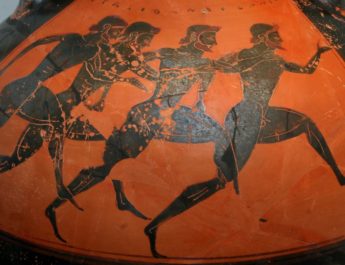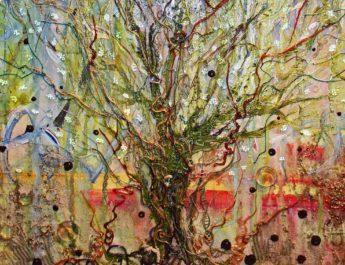Daniel 12:1-3
Ordinary B51
1 “At that timeA Michael,B the greatC prince,D
A “time” = et. Probably from anah (to answer, sing, announce); from ad (forever, all, old); from adah (to pass on, advance, decorate oneself). This is a period or season. It can also mean whenever or continually.
B “Michael” = Mikael. 13x in OT. From mi (who, what, which, whoever) + el (God, a god). This is Michael, meaning “who is like God?.”
C “great” = gadol. From gadal (to grow up, become great, become wealthy – to advance. The root meaning may be to twist in the sense of the process of growing). This is great, high, bigger, noble, old, marvelous. It can also refer to someone who is powerful or distinguished.
D “prince” = sar. This is chief, leader, ruler, lord, official, governor, prince, military leader. It refers to someone at the top of a rank or class.
the protectorE of yourF people,G shall arise.H
E “protector” = amad. Same as “arise” in v1. See note H below.
F {untranslated} = ben. From banah (to build or obtain children). This is son, age, child. It is son in a literal or figurative sense.
G “people” = am. From amam (to darken, hide, associate; creating shadows by huddling together). This is people or nation. It can be used specifically for a tribe, collectively of troops or armies, or figuratively to refer to a flock of animals.
H “arise” = amad. This is to stand up in a literal or figurative sense. So it can be establish, continue, endure, take a stand, act, be a servant, stand still, remain, stand against an enemy.
There shall beI a time of anguish,J such as has never occurredK since nationsL first cameM into existence.N
I “be” = hayah. This is to be or become, to happen.
J “anguish” = tsarah. From tsar (properly, a narrow or constricted place; figuratively, trouble, a pebble, an enemy, anguish, or distress); from tsarar (to bind, restrict, narrow, be cramped, an adversary). This is tightness, distress, affliction, trouble, or adversary.
K “occurred” = hayah. Same as “be” in v1. See note I above.
L “nations” = goy. From the same root as gevah (the back, person, or body); related to gev (among); related to gaah (to rise up). This is nation or people. Often used to refer to Gentiles or foreign nations. It can also be used figuratively for a group of animals. This is where the Yiddish “goy” comes from.
M “came” = hayah. Same as “be” in v1. See note I above.
N “existence” = et. Same as “time” in v1. See note A above.
But at that time your people shall be delivered,O everyone who is foundP writtenQ in the book.R
O “be delivered” = malat. This is to be smooth, which implies to escape as slipping away from. It can also be release, rescue, deliver, or preserve. It can be used specifically to meaning giving birth or making sparks.
P “found” = matsa. This is to find, catch or acquire. It can also mean to come forth or appear. Figuratively, this can mean to meet or be together with.
Q “written” = kathab. This is to inscribe, write, record, or decree.
R “book” = sepher. Perhaps from saphar (to tally or record something; to enumerate, recount, number, celebrate, or declare). This is can be writing itself or something that is written like a document, book, letter, evidence, bill, scroll, or register.
2 ManyS of those who sleepT in the dustU of the earthV shall awake,W
S “many” = rab. From rabab (increasing in any aspect whether quantity, authority, size, quality, greatness, etc.). This is abundance, many, elder, exceedingly, great. It refers to abundance of amount, rank, or status.
T “sleep” = yashen. 5x in OT. From yashen (to be languid or go slack; it can mean to sleep, become old or stale, or die). This is sleeping, sleepy, those who sleep.
U “dust” = aphar. Related to aphar (to throw dust, be dust). This is dust as powdered, perhaps gray colored. It could be ashes, powder, ground, dry earth, clay mud, or rubbish.
V “earth” = adamah. From the same as adam (man, humankind); perhaps from ‘adom (to be red). This is ground, earth, soil as red, or land.
W “awake” = quts. Related to qayits (fruit, harvest, dry season); from quts (summer, clip off). This is arise or watch. It is to awake in a literal or figurative sense.
some to everlastingX life,Y and some to shameZ and everlasting contempt.AA
X “everlasting” = olam. This is a long scope of time whether in the past (antiquity, ancient time) or in the future (eternal, everlasting).
Y “life” = chay. From chayah (to live or keep alive literally or figuratively). This is alive, living, lifetime. It can also be used to describe someone’s age. It can refer to animals, plants, water, or a company or congregation of people. It is life in a very broad sense.
Z “shame” = cherpah. From charaph (to expose and so figuratively to reproach, defame, carp at, defy). This is reproach, rebuke, shame, or disgrace. It can also refer to genitals.
AA “contempt” = deraon. 2x in OT. Root may mean to repulse. This is an aversion or something to which one is averse. It can also be abhorrence or contempt.
3 Those who are wiseBB shall shineCC like the brightnessDD of the sky,EE
BB “wise” = sakal. This is to consider or be prudent and so it can mean to instruct or be an expert. It can also mean dealing prudently, which implies success and prospering. This verb presumes intelligence of the subject. In one form of the verb, it can mean laying cross-wise.
CC “shine” = zahar. This is to be a light, shine, or gleam. Figuratively, it can refer to enlightening, warning, or teaching. It is to teach by giving caution.
DD “brightness” = zohar. Related to “shine” in v3. 2x in OT. From zahar (see note CC above). This is shining or brilliancy.
EE “sky” = raqia. 17x in OT. From raqa (to beat the earth in a fit of passion; by analogy to hammer something so that it is spread out or spread thin; by extension, decoratively overlaying something with metal). This is an expanse or extended surface. The dome of the firmament was thought of as metal hammered out and spread thin over the arch of the sky that we can see.
and those who lead many to righteousness,FF like the starsGG foreverHH and ever.II
FF “lead…to righteousness” = tsadeq. From tsedeq (rightness, righteousness, just cause, vindication; that which is right in a natural, moral, or legal sense; abstractly equity; figuratively prosperity). This is being just or righteousness. It refers to right in a moral or legal sense. So, it can be doing justice, clearing oneself, or turning to righteousness.
GG “stars” = kokab. Perhaps from the same as kavah (to prick, blister, burn, scorch). This is a star as shining, stargaze. Figuratively, can mean prince.
HH “forever” = olam. Same as “everlasting” in v2. See note X above.
II “ever” = ed. From adah (to adorn, continue). This is eternity, old, a duration.
Image credit: “Starry Sky” by skyseeker, 2017.




